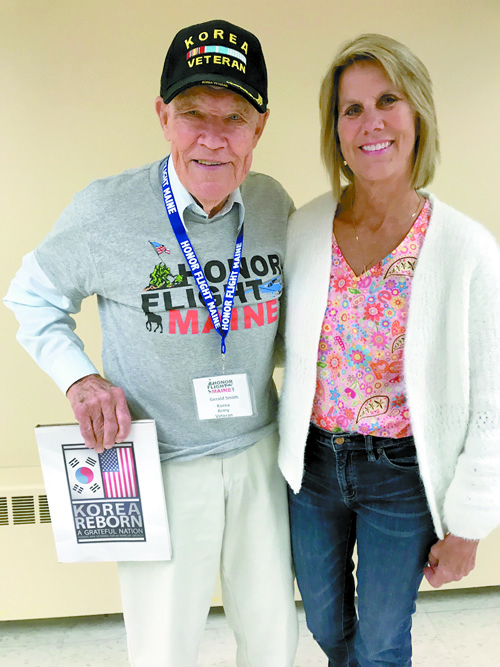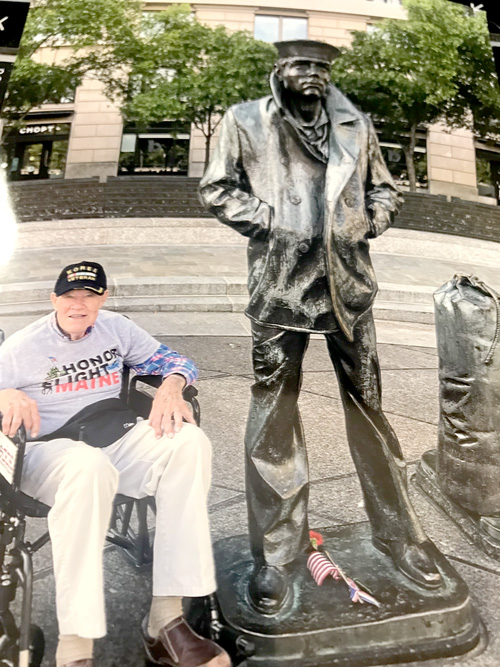Gerry Smith — ‘Honored to be Honored’
“I hadn’t been there very long and a lady came up and she had two little children with her and she said, ‘Thank you for your service.’ That is the first time in my life anybody had said that. By the time I got home, between 100 and 200 people had said that to me. Wasn’t that nice?”
— Gerry Smith, 91, Korean War Veteran talking about Honor Flight Maine

By Dawn De Busk
Staff Writer
HARRISON — Gerry Smith’s trip to visit the war memorials in Washington, D.C., and to see Arlington Cemetery, started off with an emotional sendoff from friends and neighbors in his hometown of Harrison.
“The first thing I was told to do was be at Portland Jetport no later than 8 o’clock on Friday morning. So, I left home at 7 o’clock and before I had even gone a mile, the best thing that happened to me all day happened then. I live on Cape Monday Road. I got out to Naples Road. There were a lot of cars there and there were a lot of people there. There were a lot of kids there. They had signs up, ‘Our hero.’ They were waving flags and so forth. All for me,” Smith said.
“We went down the road. You know what the big old solider did? I cried. I cried all the way to North Windham. I had to think of something else to stop.”
Smith, who is 91, went on an Honor Flight Maine trip during the last weekend of April. Smith, a Korean War era veteran, shared his Honor Flight experiences with the American Legion Auxiliary Post 139 in Harrison.
That is the women’s group. They were ecstatic to have the Harrison resident speak.
In fact, Smith has become something of a celebrity since TV news footage of him going on the Honor Flight was aired on three different TV stations.
Every channel you turned to, the TV news had a story showing Smith, according to his daughter Angela. The trip took place April 28 through April 30, she said.

Honor Flight Maine is non-profit that flies and buses elderly Veterans to see the United States war memorials from the wars they served in. The entire trip — from the plane flight to the hotel accommodations — is provided free of charge.
Last Monday, Smith described the details of his trip, mostly in chronological order.
Ever the excellent storyteller, he would provide important background information to set up a funny or meaningful story he was going to tell.
For example, he paused early in his presentation to explain some of the procedures and policies.
Honor Flight recipients travel to the various sights in a wheelchair, even if they don’t normally use a wheelchair, he explained. Also, each Honor Flight person has a guardian. In Smith’s case, it was his son-in-law Carl Pearson. He told his audience a little bit about Pearson’s friendly and helpful personality before continuing with his experience.
“I would sit there in my wheelchair while I was waiting for Carl to help others because he was the type to do that. I would wheel myself off to the side. I hadn’t been there very long and a lady came up and she had two little children with her and she said, ‘Thank you for your service.’ That is the first time in my life anybody had said that. By the time I got home, between 100 and 200 people had said that to me,” Smith said, adding “all because of this” and pointing to his Korea Veteran baseball cap.
Being appreciated was a huge part of the experience, Smith said.
Equally, there was a lot of sorrow. He felt sad about how many American have died in wars throughout the generations.
“We were bussed roughly a little less than an hour to Washington, D.C. I think that the first place we visited was the National World War II Memorial. It would make sense that it was because World War II Memorial is a pretty special place. There is so much there that it is very difficult to [see and recall everything]. We could have spent all day there, and we were going to see them all in one day. And, that was a sad thing,” he said.
“The WWII memorial is between Lincoln Memorial and the Washington Monument, right there in prime place where you can look on way to see the Lincoln Memorial and the other direction to see the Washington Monument,” he said.
Smith referred to the location as a good choice.
Also, Smith shared how he had an emotional response to parts of the memorial.
“They had 4,000 gold stars up there and this commemorated the 400,000 Americans who died in WWII. You know this, to me, was very, very sad,” Smith said. “I almost become overcome when I read these figures: 400,000. Almost a half million of our boys died in WWII, and some of our women. Isn’t that amazing?”
Smith provided some background about the memorial, which is managed by the National Parks Service. WWII ended in 1945. The park service started the design phase on the memorial in 1997.
“It was opened in 2003. Look how long [after the war] it took them to conceive that and build it,” he said.
Another spot that really made Smith sorrowful was the Korean War Wall.
“It is very sad because all of those names embronzed on those walls are those that died, those that died,” he said.
They had box lunch at the Air Force Memorial. There were statues that are spires. Nothing has been built since those spires.
“Three spires that go up like 170-feet tall, made of stainless steel. I could look right down through the valley and over half a mile, there was the Pentagon. If we go back to 2001 when that airplane came over and took the tips right off those spires. And you could just imagine that thing [plane] going right down through that valley, and crashing into the Pentagon. That really shook me for a loop, thinking about that one. How sad that was,” he said.
The next stop on the itinerary was going to the Tomb of the Unknown Solider to watch the changing of the guards.
“Now, this was right after lunch and all of a sudden the sun came out. As the sun came out, people just started pouring out of Washington and the crowd just multiplied very quickly. All kinds of people on a nice, warm, sunny afternoon. They were all there for changing of the guard. We were told while we are there, don’t you make a sound,” Smith said. “The only sound was when the guard would walk up and whomp his heels together you could hear it for a hundred yards away.”
“You can always watch the changing of the guard — that never gets old,” he said.
Following the presentation, Auxiliary President Jessica Daggett commented on Smith’s Honor Flight talk.
“For me the part of the presentation that stood out to me is the emotion he got from talking about all the names of the lost service members. Sometimes names on monuments just seem like names, when Gerry was speaking, he highlighted the fact that they were people,” Daggett said.
“Also, when he spoke about the people thanking him for his service and how that isn’t something that happens very much to him,” she said.
“I really enjoyed the presentation, it was enlightening and interesting to see how members of the military respond to the monuments that are placed in Washington DC. The monuments are meant to honor service members so to see how a services member feels about them is great,” she said.
At 91, Smith has a very obvious sense of humor. He often shared things he had observed that he found to be funny or peculiar. Also, he had a very impromptu humor. When he was told that his presentation was going to be recorded, he said, “You aren’t going to record everything I say. Oh my, I am changing my speech already.”
During the talk, Smith passed around of photo of himself very close to a famous fountain.
“That is me in the wheelchair and I was right on edge — I’m telling you. That’s me in the wheelchair right on edge with the Washington Monument behind me. All it would have taken is a little bit of a shove and I would have gone right into the water,” he said.
Over the years for his job, Smith travelled to Washington, DC., at least a dozen times; however, this April was the first time ever that he got to spend time visiting the monuments. That was possible because of Honor Flight Maine.
He wrapped up by saying, “I’m glad I went.”


